#lack of motivation is maladaptive
Explore tagged Tumblr posts
Text
psychology revision has me failing to function adequately <33
#personal distress levels are high#all my thoughts are irrational#lack of motivation is maladaptive#call me abnormal#i need to scream or sob but i can't decide which#realised before that there could be an attachment essay on the role of the father and im very much not okay with that !!!#on my hands and knees praying for a memory essay on the cognitive interview improving eyewitness testimony#anything other than that and ill give up#mr-ladystardust#a levels 2025#a level psychology
37 notes
·
View notes
Text
Writing Notes: Fear of Abandonment

Abandonment - desertion or substantial leave-taking by a parent or primary caregiver of their custodial and other responsibilities to a dependent. Dependents are usually children but may also be adult individuals who are ill.
Abandonment Reaction - a feeling of emotional deprivation, loss of support, and loneliness experienced by children who have been deserted or neglected by a parent or primary caregiver. Abandonment reaction is also experienced by adults who have lost a loved one on whom they have depended.
As humans, we depend on others for survival.
Starting from birth, the need to be fed, bathed, clothed, sheltered, and cared for is essential for survival and optimal function.
Because healthy human development requires physical and emotional care, fear of abandonment can result from unmet needs in either childhood or adulthood (Fraley, 2019).
The impact of abandonment issues can have devastating effects on personal wellbeing, relationships, and long-term mental health (Fraley, 2019).
Fear of Abandonment
Not a clinical diagnosis in and of itself.
It is a form of anxiety and a symptom of several clinical disorders, including both mood and personality disorders.
Individuals who experience abandonment are also more likely to have long-term mental health issues (Schoenfelder et al., 2011).
Those who struggle with abandonment issues have a persistent fear of rejection or isolation. It is often characterized by codependency, insecurity, and maladaptive views of power, competence, and intimacy, which makes interpersonal relationships and daily functioning difficult (D’Rozario & Pilkington, 2021).
Signs of Fear of Abandonment
Fear of abandonment can manifest as anxiety, insecurity, and isolation.
Symptoms of abandonment issues can begin in childhood and extend throughout the lifespan if left untreated.
Signs of abandonment issues in children include:
Acting “clingy” or experiencing emotional dysregulation when left alone
Excessively worrying or panicking about losing someone close
Generally fearing being alone
Getting sick more often due to stress
Children may get anxious in new settings, situations, or when dropped off at school or daycare. Symptoms may also lead to isolation, low self-esteem, and unhealthy coping mechanisms such as substance abuse and eating disorders (Mack et al., 2011).
In adults, signs of abandonment issues include:
Pushing people away. This presents as withdrawal, exhibiting trust issues, and the inability to be open and honest with loved ones.
Codependency. Codependency is when individuals rely on other people to meet all their emotional needs. People who become overly needy and possessive in relationships are often codependent.
Anger. They might allow others to get close to them but then become aggressive, reactive, or volatile if they feel threatened or upset.
Long-term effects of abandonment often lead to general anger, mood swings, and lack of confidence (Mack et al., 2011). Fear of abandonment is primarily characterized by the inability to establish or maintain healthy relationships.
Fear of Abandonment in Relationships
Fear of abandonment can negatively affect any relationship (Fraley, 2002). These include professional, intimate/romantic, and social relationships, as well as casual acquaintances.
People who experience fear of abandonment may have ruminating and irrational thoughts (anxiety), question other people’s motives (mistrust), or make false assumptions about how another person interprets an interaction.
For example, a partner might have irrational or excessive fears that their spouse is having an affair because they had been cheated on in the past. The partner constantly accuses their spouse, creating arguments and conflict. The lack of trust and discord creates distance between them, and the couple stops communicating and grows apart.
Signs that abandonment fears are negatively affecting a relationship include (Fraley, 2002):
People-pleasing or one partner always giving too much or reaching out
Envy or jealousy of other people’s relationships
Inability to trust another person
Constant feeling of insecurity in the relationship
Needing to control all decisions and aspects of the relationship
Inability to provide or accept physical or emotional intimacy
Causes of Abandonment Issues
A variety of experiences play a role in fear of abandonment and abandonment issues.
These include (Mikulincer & Shaver, 2010):
Physical or emotional abuse or neglect
Any trauma experienced because of abandonment
Feeling rejected by caregivers
The death of a parent or primary caregiver
Being emotionally or physically abandoned by a friend or loved one
Fear of abandonment generally begins in childhood and results from adverse childhood experiences (or ACEs).
ACEs describe different types of stressful and traumatic experiences, such as neglect, abuse, or traumatic loss (Feriante et al., 2023).
The first year of life is impactful to a child’s development, and a child’s attachment style is formed by the age of five (Feriante et al., 2023).
Abandonment issues are closely linked to insecure attachment styles and the inability to form close, stable relationships.
People will often choose partners or be drawn to relationships that fit patterns from their past, based on attachment styles.
Fear of Abandonment and Attachment styles
Bowlby (1969) defines attachment as a lasting psychological connection between two human beings. As the founder of attachment theory, he believed that parent–child interactions early in life determine cognitive and behavioral social connectedness throughout the lifespan.
Secure attachment styles are demonstrated by a person who can trust and be open to others (Bowlby, 1969). A securely attached person is responsive, warm, and can form healthy close relationships.
On the other hand, insecure attachment results when children have caregivers who are either inconsistently available and nonresponsive or completely unavailable and neglectful (Mikulincer & Shaver, 2010).
The 3 types of insecure attachment styles (Bowlby, 1969):
Avoidant attachment styles are seen in those who cope with abandonment issues by not allowing others to get close. Individuals with avoidant attachment are distant, withdrawn, and not trusting of others. They fear commitment and shut down or end relationships to avoid conflict.
Anxious attachment styles are seen in those who latch on to others and create intensely close, codependent relationships to cope with fears of abandonment. People with this attachment style seem needy and have trouble separating themselves from their partner. They are emotionally reactive and perceive conflict as a threat that their partner will leave them.
Individuals with disorganized attachment styles are uncomfortable with closeness and intimacy and may lack empathy. Disorganized attachment is often associated with antisocial, narcissistic, or BPD traits.
Fortunately, even if insecure attachment styles are developed in childhood, the problematic behaviors and fear of abandonment associated with them can be treated and, ultimately, changed.
Overcoming Fear of Abandonment
While fear of abandonment is associated with many mental health and mood disorders, it is highly treatable.
Individuals who seek help can improve personal wellbeing and interpersonal relationships.
Therapy Treatment Options
Attachment-based therapy uses a supportive client–therapist bond to address issues with mental health, such as depression and anxiety. It targets thoughts, feelings, behaviors, and interpersonal communication that clients avoid or over-amplify based on early-developed attachment styles (Pilkington et al., 2021).
Behavioral therapy incorporates talk therapy to root out unhealthy behaviors and habits that are related to the mental health conditions underlying the fear of abandonment.
Cognitive-Behavioral Therapy (CBT) helps clients identify faulty thinking patterns or cognitive distortions and replace them with more adaptive thinking patterns. This evidence-based form of therapy is effective at treating anxiety and depression and improving relationships through changing perspectives and communication patterns.
Psychodynamic therapy encourages clients to identify and resolve unhealthy unconscious and conscious thoughts about past experiences. Through improving self-awareness and understanding, clients can see how their past may influence present thoughts and behaviors and make changes.
Psychoeducation provides information to a client regarding a diagnosis, treatment options, and underlying theories (such as attachment theory) that may contribute to abandonment fears. Often, understanding and labeling problematic behaviors and fears can be one of the most helpful steps in healing.
Sources: 1 2 ⚜ More: Notes & References ⚜ Writing Resources PDFs On Attachment ⚜ Avoidant ⚜ Anxious ⚜ Secure ⚜ Disorganized
#abandonment#attachment#psychology#writing reference#writeblr#writing notes#studyblr#literature#writers on tumblr#dark academia#spilled ink#writing prompt#light academia#fiction#creative writing#character development#writing inspiration#ilya repin#writing resources
249 notes
·
View notes
Text
Rahuvian Observations
(Rahu in the 1st or 10th houses, Rahu ruled big three or stellium, Rahu conjunct personal planets, or ig whatever resonates for you) Based on my experience as a super Rahuvian Person. And yes I’m guilty of a lot of this lmao.
Ardra, Swati, Shatabhista
Competitive, and may be very bitter and aggressive when in this mindset; “it is not enough to succeed, others must fail.”
Devil’s Advocate.
Lack religious or spiritual affinity; if they are these things other astrological influences are at play, or they are performing
I have no proof of this but I feel reality TV as a concept is very Rahuvian because like. That Is Not Fucking Reality
Addictive tendencies, and not just in the traditional sense (alcohol, drugs, sex). They’ll get addicted to things you’d never think of. My Strange Addiction. Probably pioneer new addictions. The first vape addict was rahuvian.
Prone to anxiety
May project their feelings onto others.
Related to the two points above, their anxiety can be eased by taking strides to be moral and upstanding. If they’re doing bad things, they’ll perceive others are being bad, but if they’re doing good things they’ll view others as good
Really good or really bad fashion, there seems to be no in between; fashion sense could be an…acquired taste
Unexpectedly good/attractive/curvy/muscular bodies beneath their clothes
Rahu is a feminine planet but frankly most rahuvian women exude boyish charm
Rahuvian men might be insecure in their masculinity and overcompensate; may have toxic masculinity
May be more prone to identifying as nonbinary, genderfluid, etc. (I say this only because Rahu rules the future and the unconventional—when these identities become more commonplace Rahu will cease to rule them)
Can be corny ngl.
They’re cringe and what’s crazy is they believe in cringe and making fun of other people but then hate when others do it to them.
I think all nodal people are prone to extremely shocking behavior, but the motivation is the key difference. Take gore sites for example. A rahuvian might brag about their strong stomach when in reality they spent two minutes on the site. A ketuvian might spend all day looking at the site, but mention it offhand and refuse to speak of it again
May do odd things and have odd justifications for those things, but they swear it makes sense. a + b = €#*{+£]’
Cyber stalkers, keyboard warriors. You’ve had to block a Rahuvian before.
Conspiracy theorists, or maybe taking part in the conspiracy. Who knows 👀
Not the most romantic, but can certainly lose themselves in relationships with others; they become obsessive
Others might become obsessed with them; parasocial vibes all around
May seek out partners of high status
May seek out partners who they find “down to earth” and grounding
Online dating
Unfortunately, I have heard many accounts of a rahuvian person threatening to hurt themselves and others after being broken up with or rejected
They may be a victim of extreme physical or emotional violence—think of the mythological Rahu. Getting decapitated is one of the most violent things that can happen to you after all
Also like Rahu (a demon, and a deceiver), they do not make for “perfect victims.” Any past problematic behavior or maybe even their general personality/public persona may cause people to not sympathize with them
They like high quality things. Quality over quantity.
May overspend or go into debt, but this is up in the air. The source of their money (and how much) depends on the rest of the chart.
May seem air headed, or superficial. It’s not that they aren’t capable of deep feeling or thought, they just don’t like to show it to others.
Maladaptive daydreamers
Pathological or Compulsive lying
“All the world’s a stage” “the game of life”
Naturally very funny, but usually when they’re not trying to be. When they try to be it can be funny…but also uncomfortable. Will do anything for a laugh/response from the audience. Reminds me of that trope when a character tries out comedy and realizes that insulting audience members will get them a lot of laughs, but then it backfires
181 notes
·
View notes
Note
That encounter joke Anon is wrong. Every 5e GM I've ever met went the route of "one fight per day oh my boss is already dead accutally he has 50 more hitpoints and now here's 2 more minions now the fight is properly exciting and dramatic" and the lack of a poker face meant we all knew.
How do you feel about that kind of rewriting, anyway?
For context, none of the GMs ever admitted to this on the LFG posts, or the pitches, etc.
I'm not opposed to it on principle. Ultimately I do think it's a bit like "oh so you're shifting the goalposts when it seems like the party is winning the encounter more easily than you think they should have," but ultimately that's just a maladaptive response to a different issue. Which is, once again, people trying to run D&D as a game it very much is not.
D&D isn't a game of epic bossfights where characters snatch victory from the jaws of defeat after an extended combat encounter. It can produce such encounters but they will usually emerge incidentally, not naturally. D&D is ultimately a game of attrition, of managing character resources through the course of an extended period, and even though D&D 5e's actual expectations of what an adventuring day is supposed to look like are whack D&D 5e does support a type of gameplay that relies on managing resources over an adventuring day much better than it does "a single epic setpiece encounter per day."
Because ultimately D&D is at its best when it's about weaponized player agency and system mastery, and in modern D&D this sometimes manifests as "the party knew they were going up against a lich so utilizing everything they know about liches they kicked that guy's ass in two turns." Now that would be really anticlimactic if the GM had set that encounter up as narrative culmination of a campaign that had been leading up to this moment for two years. But if you take it as "just one more encounter in the story of a bunch of assholes trying to grow stronger and more epic" then it's just a moment of those characters getting to flex for a moment.
Now of course adjusting the stats of a monster on the fly is sort of a problem in that it goes against the game and thus undermines player expression within the game. When the group pulls off a cool trick that immediately deals a million points of damage to the dragon's dick and you say "oh actually the dragon had two million hit points" then you're ultimately undermining player expression. I don't think this makes someone a bad GM because the motivation behind it is usually to provide a more entertaining experience for the group, but it is a sign of a GM fighting against the system and not knowing what it does, and they and their group would probably be better served by another game. And given that players won't necessarily know that happened it maintains the illusion that the game does produce that type of encounter.
My advice? As a GM, be honest: "hey, I didn't think you all would one-shot that boss. Are you okay if we add a bit more HP to that thang?" And if this is a consistent issue of the game not producing the type of experience the group wants they should ultimately look for a different game.
511 notes
·
View notes
Text
There's a lot of fluff about how Harry shows no sign of trauma from his upbringing but maybe it's because I was neglected and often spoken of as extremely well-adjusted, but to me Harry seems to be a pretty natural response to a combination of neglect and a stable upbringing? He's not like. Traumatized. But a lot of people just develop maladaptive habits from these circumstances. Like:
Dissociative tendencies. I know this one is not intentional, but he shows constant lack of focus which interferes with his schooling and will often just space out and stare at things. This is used as a device to point the reader towards plot relevant items and turn them from irrelevant details, but it is something he does.
Harry does not actually distrust adults outright at first! He goes to teachers for help! But he tends to disrespect them, and struggles to think of adults as figures of authority the moment they slip up. Hagrid's bumbling chaos, Quirrell's nerves, Snape beefing with an 11-year-old, McGonagall not taking his Very Real Concerns seriously, Vernon's bluster, these are moments Harry discards their authority - that child thought McGonagall was going to burn him at the stake at first, but was barely shaken by her later. And it makes sense! You are a powerless child, you are looked down on, but the "consequences" you face are things you got used to and feel are normal, so you take strength from being unafraid of punishment.
A lot of fluff is made about abuse victims and independence because yeah, obviously, but I do think a lot of his savior/martyr complex is egged on by his servile role; he lived his entire life apart from the Dursleys, but they relied on him. To be crude, when someone shits the bed he puts it in the washer. And I do think he takes satisfaction in being the best man for the job, and I do think that can breed a whole host of mental problems that will lead you to a fated suicide duel with a Dark Lord
The books are mean-spirited in general, but he learned a lot of the fundamentals on engaging with the world from the Dursleys. He's pretty consistently petty and vindictive! And I genuinely believe Harry is, personally, as a character, fatphobic (in addition to the doylist text being fatphobic), because it was something Dudley gets criticized for and thus something that proves Dudley isn't infallible, and he would have definitely fixated on it and felt comfortable doing so, because that's just how the Dursleys talk about people.
For that matter, he is in general stifled by the inner lives of others - he's somehow the most socially stunted person in a trio with Hermoine in it. He is at all times deeply uncomfortable by the thought that other people have feelings and motivations, and reifies people with strong, clear roles in his life, and a lot of his development is realizing there are people behind those roles. I stand by the fact that Harry naming a child after Snape is a symptom of unaddressed mental illness.
This boy is so unbelievably susceptible to mania. I'll acknowledge a lot of his behaviour is teenage bull-headedness but the way the extremes of "I need to be doing something Now" and catastrophizing only gets worse...You know when he's 30 he's going to get prescribed mood stabilizers
And these are all things that can spiral into really toxic and self-destructive behaviour, which we know because that's what happens in the books. I think part of pushing his trauma in fanfiction is accepting that sometimes when someone is traumatized they develop an awful personality instead of PTSD.
(You may now reread this entire post and think about Tom Riddle.)
168 notes
·
View notes
Text
house md rewatch: 2x12, "distractions"
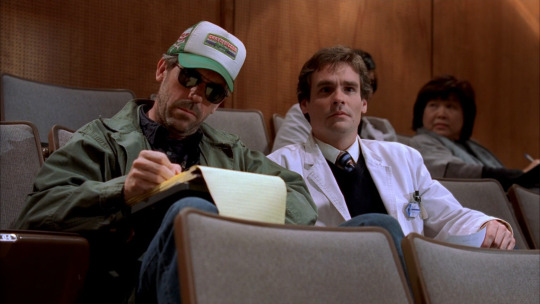
kinda messed up of them to pair such a traumatic patient story with one of house md's funniest b-plots (imo).
oops, all gregory house!
it was smart of them to ease us into house's mega-destructive tendencies through humor first. season 7 would only be more jarring if we didn't have such an extensive lead-up. and i just love this episode. the goofiness is refreshing, but it doesn't lose its poignancy by the end, wilson looks cute, cuddy is here (for once), the fellows are exhibiting genuine teamwork and bond over concern for house, and house trips balls.
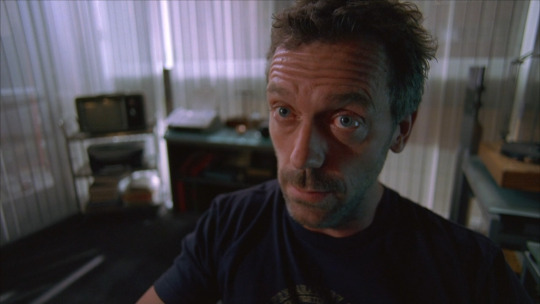
on the whole, i think this episode is about layers - quite literally the layers of dead and burned flesh they remove from adam, the patient, and the layers house adds onto himself to avoid confronting his real feelings post-stacy. interestingly, house choice to disprove his nemesis, dr. weber, parallels the same layers he accumulated post-infarction that have led to his misanthropy:
infarction -> self-destructive choice -> pain -> vicodin -> maladaptive behavior.
loss of stacy -> self-destructive choices -> induced pain -> LSD -> maladaptive behavior.
on the nose though it may be, like i said, it's an important precursor to the ever-increasing number of instances where he does Dumb Shit.
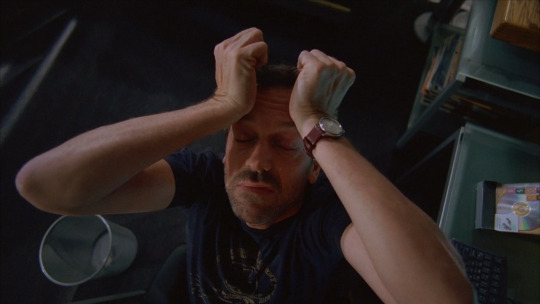
i also appreciate that this episode reaffirms wilson's harsh reality check from the end of 2x11; it wasn't just wilson blowing off steam, but a real condemnation of house's worst behaviors. he reminded house that, while he doesn't like himself, house admires himself because of his intellect. the misery he is so quick to infect other people with comes part and parcel with that intellect, so the fact that he threatened his very way of thinking by dropping acid says a lot about his state rn. but by proving dr. weber wrong, he hopes to regain his surety in himself & deflect the pain he feels in coming at him from all sides.
and it's his guilt over waking up adam and putting him in excruciating pain that motivates him to "take something." his haunted expression here is hard to miss:
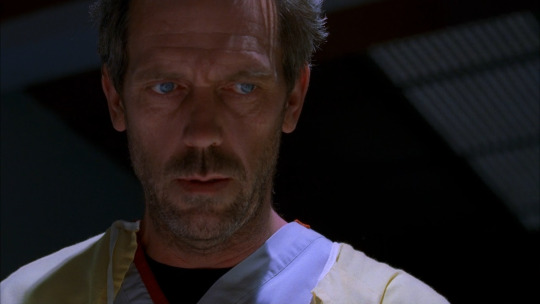
this reminds me of, again, what he tells wilson in 1x22 about stacy - does he want "to be with her" or to see her "suffer?" 2x12 features this dilemma in a macro scale; does house want to solve this case in the name of doctorly altruism, or is he solving it for selfish reasons, to regain his sense of self?
i love the following visuals that highlighted house's isolation in spite of the overly colorful bathroom tiles. his cane is the darkest streak of color, or lack thereof, and it makes his half of the shot weighted. the perspective is somewhat bent towards house, like the gravity of the room is spilling out of the open shower stall, plopping house on the outside. very disorienting!
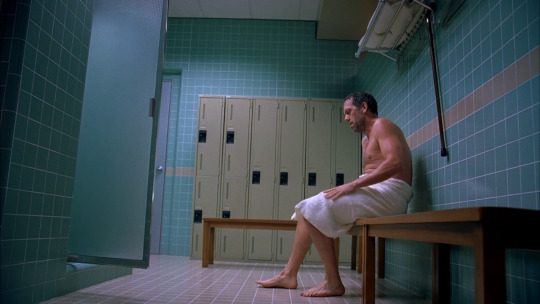
cameron's introduction into the scene is a shock of reality. the red of her shirt is the kind of striking visual that house wants to avoid during his pseudo-migraine. she also breaks up the otherwise solid rule-of-thirds in the previous shot, representing another mote of disruption.
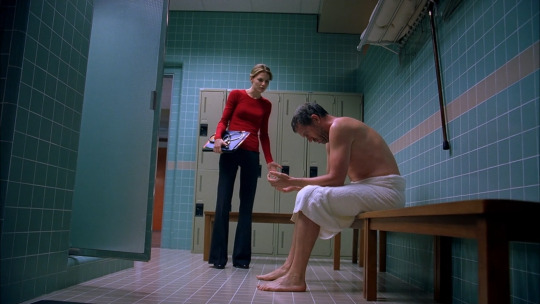
house's parting words to cuddy are even another layer deeper/better than what they seem at first. he describes how he took a cocktail of everything to counteract every modicum of pain incurred by the migraine drug test run until he arrived at equilibrium: "the universe always settles the score," he claims, until retracting with "no, but it should."
what i like about this is what it says about house's balance, or lack thereof. i was worried throughout my first watch of 2x12 that one of the various substances house was taking would interact with his vicodin. that's house balance, a layer of separation attempting to hold his disparate pieces together; in his mind, those pieces are pre and post infarction. wilson - again, however harsh and one the nose - was right when he reminded house that he "gets distracted by pain." i'd even wager that, on top of pain being a distraction, the puzzle of how to avoid/mitigate it is equally as distracting.
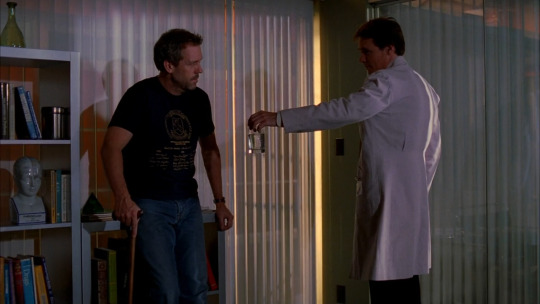
also - this was cute. fake ass bitch. i saw how you undercut your mean lecture with a loving action, which we've textually established means more in the way of love than any kind words do.
i'm gonna bullet point the remainder of my notes since 2x12 is mostly made up of moments that i like, rather than a super cohesive message:
cameron, chase, and foreman being mutually concerned over house in the cutest way possible. this is a rare instance of them all agreeing on something - to be worried about him. i also love how they all insist on disliking each other at different points in the show because moments like this remind me of how silly that is.
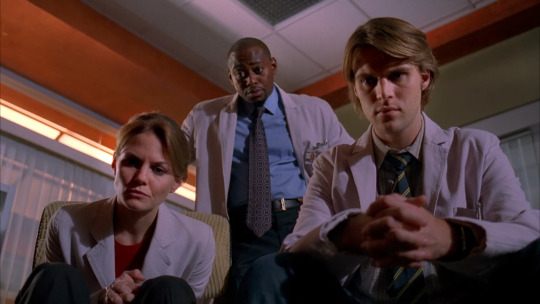
this is the funniest scene ever. or at least it's very high up there. wilson walks in with the following agenda: listening to nothing dr. weber has to say; pretend to be mad that house is going to do something disruptive; enjoy every second of that disruptive thing; reminisce about his weird med school history. thanks for the exposition, james!
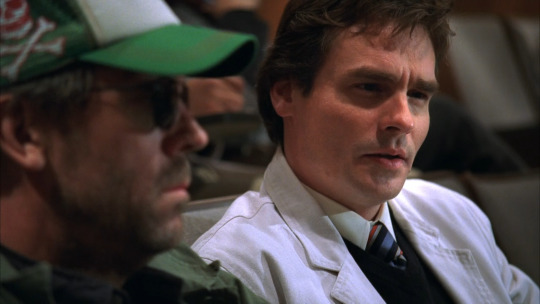
one moment, house and foreman are walking down the hallways alone. in the blink of an eye, cameron and chase just materialize wordlessly behind them.
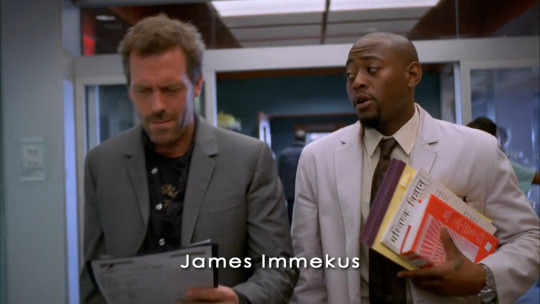

the introduction that house cheated off weber, though to no avail, strikes an unexpected and almost uncomfortable chord with the audience who presumed, basically by instruction from the show, that he was infallible in that department.
foreman hands house his cane after they both had a physical altercation in the sterile room where house was trying to wake foreman up again. i love how that gesture is filled with so much solidarity yet it so casual. the idea that there's a literal weight in house's leg, alleviated somewhat by his cane, that's then alleviated by receiving the cane from his friends? goes crazy.
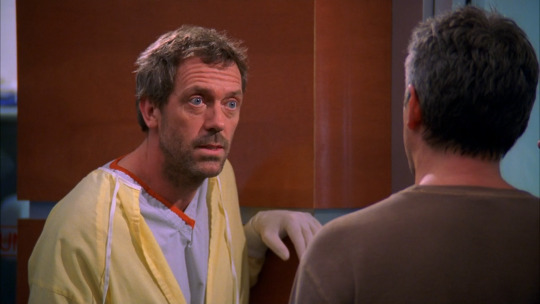
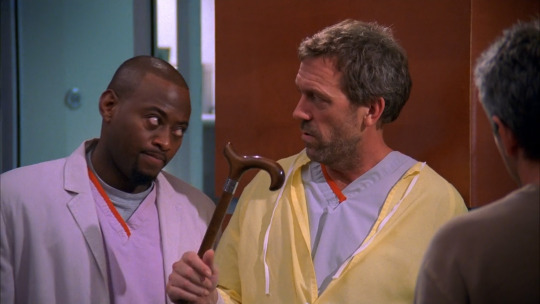
he's even clutching at the wall for support before foreman arrives.
finally, the introduction of House's Hookers. i don't like this moment, per se, but it's a plot thread that stands the test of time, and undercuts the lighthearted tone of this episode in general.
overall? 10/10 from me in terms of just general Viewing Pleasure. tons of episodes deliver way more punch, emotional depth, and drama, but i think i've seen 2x12 more than any other house md episode apart from 5x04 and 8x20. another installment in my strange collection of favorites, i'm sure.
#pretty tame recap i suppose#this is a very digestible episode#more than anything i just love the scene of him in the lecture with wilson what can i say#greg house#james wilson#allison cameron#robert chase#eric foreman#lisa cuddy#house md rewatch#rewatch 1#season 2#house md#malpractice md
68 notes
·
View notes
Text
What career suites you best based on destiny matrix? (part 3/3)
part 1 part 2
To find out what career suits you best and what can you do to succeed, we have to look at the number under the dollar sign.
note: there are so many different career choices and the options I'm listing here are just general examples based. you're free to choose any career, and hopefully, you don't feel pressured by this post to suddenly become philosopher.
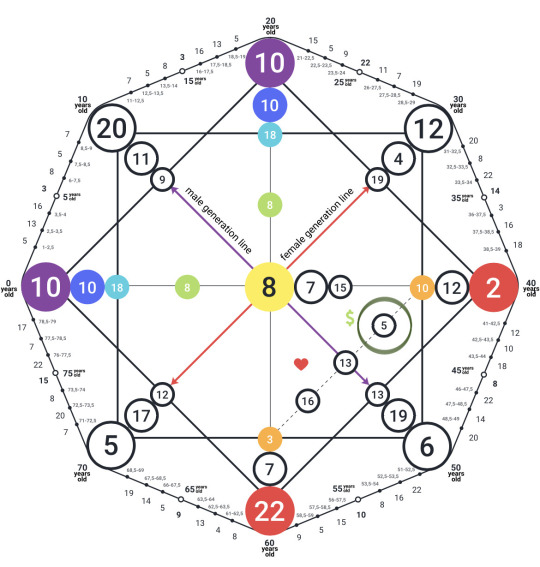
16 - The Tower
People with the tower energy are resilient to change when it comes to finances and career. They face obstacles that affect their careers and finances pretty often, but still they can overcome all the problems. These people are strong, adaptive and energetic.
The most suitable career:
lifeguard
builder
electrician
renovator
Challenges that affect career:
fear of change (the tower is a proof that you can overcome all the obstacles, rebuild yourself and your career)
self-destruction
overestimating your skills
unfortunate circumstances (something that can't be forseen like job loss)
I couldn't find famous people with this placement. If you have it, please tell me what you do for a living 🤩
17 - The Star
People with this energy usually have a dream job, and they can achieve their dream if they believe in it. They are creative, artistic and the public loves them. But it doesn't mean that their career will be necessarily related to art, it may be something more mundane, but it requires a creative approach.
The most suitable career:
artist/actor/singer
designer/architect
astrologer
astronaut
Challenges that affect career:
rejecting your dream
being shy about being talented
being passive
"star sickness"
over consumption
Famous people with this placement: Zaha Hadid (architect), Ryan Gosling
18 - The Moon
People with the moon energy are empaths who have an ability to to materialise their thoughts. The can achieve the most success when they do art or create something material.
The most suitable career:
poet/writer
doing show business
astrologer/fortune teller
psychologist
bloger
Challenges that affect career:
fear of failure
taking no action towards your dream (maladaptive daydreaming entered the chat)
storing negative energy (repressed anger, holding back tears, etc)
escapism
Famous people with this placement: Kylie Jenner, Lana Del Rey, Elvis Presley
19 - The Sun
People with the sun energy are ambitious, energetic, they know how to make people pay attention to them, know how to lead the crowd. When the energy is in the negative, these people can get fixated on one thing, which may lead to burn out.
The most suitable career:
politician
CEO
motivational speaker
global artist
top manager
Challenges that affect career:
pride
excessive demands on people around you
being critical
inaction
Famous people with this placement: Beyonce, Justin Biber, Rihanna, Kim Kardashian, Zayn, Kurt Cobain
20 - Judgment
First of all, this arcana is related to your family. You have to check how you parents/family affect your relationship with money and career. Maybe they have a belief that it's impossible to get rich, and therefore you adapt their belief. Moving on, 20 indicates success in the fields of politics, science and education. Also, 20 can indicate having a successful business with family.
The most suitable career:
journalist
politician
advocate
scientist
philosopher
teacher
Challenges that affect career:
being involved in family conflicts
controlling tendencies
dependence on the opinion of elders in the family
fear of change
denial of progress
lack of education
Famous people with this placement: Priscilla Chan (pediatrician and philanthropist, co-founder of Meta), Tatyana Kim (CEO of the largest online retailer platform in Russia, teacher, before staring business with her husband she was teaching English), Perrie Edwards, Aaliyah
21 - The World
People with the world energy are able to carry large-scale projects. They are influential, open-minded and they are in tune with the world around them.
The most suitable career:
diplomat
traveler
travel agent
software developer
artist/musician/actor
Challenges that affect career:
power abuse
staying in comfort zone
limiting beliefs
intolerance
technical backwardness
Famous people with this placement: Timothée Chalamet, Camala Harris
22 - The Fool
This arcana makes people spontaneous, they are guided by their passions and intuition. They are the ones who can come up with successful startup, business plan, etc. Also, they have creative/artistic potential. The downside of the fool is that office job and schedules make them stress too much, because they find it hard to concentrate.
The most suitable career:
bloger
movie director
startup(er)?
dancer/actor/musician
producer/movie director
poet
photographer
Famous people with this placement: Elon Musk, Kris Jenner, Marilyn Monroe, Donatella Versace
287 notes
·
View notes
Text
Shifting can be escapism, and that's OK.
Im going to give you a valuable lesson, so stick to the post, dont skip because every word is important. Don't let that small attention span get to you baby, remember that knowledge is power.
My name is Willow! I'm a non-dualist reality shifter, shifting coach and subliminal creator who's a freak for the multiverse and knowledge. Everything I say on here is based on my own personal experiences and research.
This post can help you with:
Escapism, guilt for shifting, realising you're worthy of shifting.
The self determination theory (SDT) is a psychological theory of motivation. It focuses on the degree to which specific human behaviour is for the self ; self motivated and self determined
Basically, what exactly is it that a human being can do, that isn't manipulated by outside influence, but rather their own human nature?
According to the theory these are 3 self motivated human behaviours:
Autonomy
Having the freedom to decide your actions without outside influence.
Example: Being able to go out with your friends, without your parents restricting you.
Competence
The ability to do something effectively and be useful.
Example: You're a very useful employee at your company, this means you are competent for your job.
Relatedness
Being connected or related to someone, or something.
Example: Having a connection with family or friends
OK, so how does any of this apply to shifting and escapism?
When you lack one of any of these 3 behaviours or feelings, this is a disruption your human nature. Naturally by birth, you are within your birth right to recieve all of this.
Each of these behaviours, have extreme importance in your cognitive behaviour
- Cognitive behaviors are thoughts, ideas, and representations of yourself to others.
If you don't have the will or ability to control your actions independently, you are most likely going to feel stuck, and like everything is out of your control. Doing things that make you happy and activities you find meaningful, will become an issue due to your lack of autonomy.
If you don't feel competent in areas of your life, or people aren't competent when it comes to you, this can create low self esteem and a bad self concept, you may think of yourself as "worthless" "useless" or "incompetent"
You may feel less motivated to taking on new challenges and activities, as you feel like you're just going to fail, and mess everything up anyways.
Connection is what makes us human, love and empathy towards overs and receiving it, is what makes human life so special. Relatedness, is what you need to experience caring relationships, to be part of a community, and overall to feel love. Humans need love, that is a fact.
When these basic needs aren't met, a human being can lack the motivation to commit to any one of these factors, which take up a huge part in life.
Lacking these can make you feel, stressed, anxious, self loath and nihilistic.
When you don't have these 3 factors, this causes a lack of motivation to commit to them, which means you don't have them.
So you turn to something else, escapism.
"Escapism is the tendency to distract oneself from real-life problems. It can also be conceived as shutting meanings out of one's mind and freeing oneself from self-awareness for a while . Escapism has been identified as one of the key drivers behind online behaviors, in both adaptive and maladaptive ways"
- PubMed Central®
Link to study
Think of escapism like touching a hot stove. Imagine you place your hand upon a stove. At first its cold, and you're fine.
Then the temperature starts to slowly rise, its currently warm, its still fine you can deal with it. Now, it's getting hotter, and hotter, and hotter...
And you remove your hand.
Not on purpose, but by instinct.
By reflex, your hand immediately moved away from the stove once it got too hot.
Your nervous system felt the pain, which sent a signal to the brain, that something with your hand is wrong.
Biology isn't my strong suit I fear.
Another example.
You're in immediate danger, there's a tsunami coming your way, it's too big for you to face, if you stay where you are, you're going to get crushed by the water, and die on impact. So what do you do?
You run.
Naturally you escape from the dangerous situation, because who in their right mind would test their luck and try to survive a tsunami?
Are you getting it?
When human beings are faced with a situation that is uncomfortable, causes mental, or physical harm, or even death, their first response is to escape.
It is human nature to run, to escape, to not face the dangerous situation. Sometimes it can be a bad move, like ditching a daye you were nervous for, other times it could be skipping school because you constantly run into a group of serious bullies.
Repeat after me.
If you are in a situation where you do not feel loved, worthy, or free, you are allowed to escape.
You are allowed to escape.
Empathise on that baby, nobody is going to tell you off for it.
However, you must be weary of using shifting as escapism.
Shifting is a wonderful phenomenon, it is not something that determines whether you live or not. It doesn't determine your worth either, nor is it something that causes you psychological stress.
If you find yourself having suicidal or self harming thoughts, with shifting as a way to mend these thoughts, I beg of you to take a step back and evaluate these thoughts of yours.
Shifting is a journey, I preach that it's something that can be done on the first go, but that isn't the case for everybody.
It can be as short or as long as you make it, failure in shifting when using it as an escape from serious issues, is a one way road to psychological distress.
With that, I ask that you first deal with your mental health, before anything else.
Find something that makes you feel good and grounded, something you enjoy.
Please remember, that not everything is something you must be good at, if it came from you it's already perfect.
Meditation, painting, dancing, listening to music, writing, exercise. Anything and everything that makes you feel good, nothing is too silly, nobody is going to think you're weird or bad at doing something you love to do.
I found that talking out loud, writing in my journal, mediation and watching anime helped me a lot when I had "life impacting plans" connected to shifting.
LESSON SUMMARY
1. It is natural for human beings to run away when they are faced in a dangerous or uncomfortable situation
2. Shifting being used to run away from a bad situation, isn't negative. It only becomes negative once you prioritise it over your own health
3. Your mental and physical health always comes first before shifting
4. You deserve to be loved, to feel worthy, to not be let down, and to be free, whether that's through shifting or not!
#reality shifting#shifting#shiftblr#shifting blog#shifting reality#shifting community#law of assumption#loa#manifesting#tw: suidice#ཐི⋆♱⋆ཋྀ theia's thesis
224 notes
·
View notes
Text
random thought but I don't think Lup and Barry taking their sweet time to get together is necessarily inherently indicative of repressed feelings or emotional constipation. with respect to emotional constipation in particular, I don't think that's an inherently wrong or out-of-left-field interpretation — for example, it's certainly not out of character for Lup to have trouble vocalizing feelings to her loved ones, and this is by her own admission — but to me personally, I never really interpreted it as a major factor in the timeline of her relationship with Barry.
or maybe, it would be more accurate to say: specifically in canon, I don't think it's implied that some unhealthy denial of feelings, or lack of communication in a seriously unhealthy and repressed way, is a significant reason Lup and Barry take a long time to properly get together. I don't think it's implied that anything like that was a defining feature or otherwise major theme of their relationship, particularly their relationship between the development of mutual feelings and the "talk" at Legato. because seeing the way that Griffin's monologue talks about their relationship developing, during that period:
"This new love, it wasn’t their focus during the journey. Barry worked tirelessly to understand each world you traveled to, to understand the Hunger and figure out a way to defeat it. Lup grew furiously in arcane power, studying the mystical secrets of the planes, hoping to master whatever spell would break your team out of their desperate retreat. But there were moments between those studies, meals shared in secret, just the two of them under the guise of their work, sightseeing trips for two across these doomed worlds. (...) Looking back, this performance is where that love that Barry and Lup cultivated quietly and cautiously over the last half century truly bloomed."
first, Barry and Lup are depicted with very understandable reasons to prioritize other missions, and other personal growth. it's not impossible to read this as a sign of repression, and in fact, I'd be shocked if neither of them ever threw themself into their work as a maladaptive coping mechanism for something, relationship-related or not — but staying focused on matters of life, death, and the multiverse's continued existence hardly needs repression or emotional constipation as a motivation or impetus.
moreover, I would argue Griffin's monologue doesn't actually frame Lup and Barry's priorities here as an unhealthy work-life balance. Griffin, as narrator, doesn't take a morose or otherwise negative tone when he discusses Barry and Lup's studies — there's even this laugh in his voice as he describes Lup growing "furiously" in power, one that seems meant to lead the audience to a sense of joy and pride. and if Griffin meant to convey these priorities as unhealthy, I think he also would use much different language to describe the time Lup and Barry still spent together — but in fact, their budding relationship is not framed as an incompatibility with their work; it's framed as something that occurs alongside their work, and in addition to it.
and this approach Lup and Barry have to spending time with each other, growing closer? it's described as a love that they "cultivate, quietly and cautiously." it's very specifically active, not passive. they're not running away from each other — they're also not rushing ahead, they're still "cautious," but they're importantly choosing to spend time together. it's something that they mutually want. they are, by and large, for the majority of the time pre-relationship, not avoidant of each other. they are willing to act on their feelings, in a way that's short of entering a relationship — but acting on them, meaningfully, nonetheless.
and could poor communication play a role in this? of course. but what if the main, driving factors in the time they take to get together are actually just... both of them being comfortable taking a long time to get together? comfortable balancing the time they spend with each other with their research to stop the Hunger? comfortable, more comfortable than the alternative would make them, with cultivating their love slowly, not officially confessing or dating until they're ready?
after all, as Taako reminds Barry, and Barry presumably takes to heart — the whole crew, they have all the time in the world. Taako tells Barry that he and Lup don't have to panic, don't have to rush — so naturally, Barry and Lup use the time they have. and they're not necessarily champions of talking about their feelings, but taking their time isn't framed as inherently unhealthy, either. given that they're depicted as cautious, and as nervous — on the beach cycle, before getting Taako's advice, in Barry's case, and in Legato, right before the duet, in Lup's case? the ability to take as much time as they need might even be freeing to them.
anyways. I've enjoyed, and to some extent, even written fics and other fanworks where Lup and Barry's pining bleeds over into angst, brought about by an inability to talk about their emotions. again, I don't think that's inherently out of character. but part of the reason I don't think it's OOC is because — at least in non-AUs — there's 30 years between Lup and Barry's feelings becoming unambiguously mutual (the robot cycle, where Lup "knew"), and the two of them getting together (Legato).
30 years is enough time for a lot of variation, in relationships and in people. a lot of bumps that don't define the relationship in entirety, over all of that timespan.
so. I just don't think Lup and Barry spend those whole 30 years angsting because of miscommunication and emotional constipation, that's what I'm saying. all I'm saying, really. I took a truly ridiculous amount of time to say that, in hindsight. but I'll do anything for a reason to think about Blupjeans.
#taz#taz balance#taz balance spoilers#blupjeans#lup taaco#barry bluejeans#taz meta#long post#basically just like. as an aro give me all the characters with unconventional relationships with romantic love#gimme all the characters who are only interested in romantic relationships under certain circumstances#whether they're written or interpreted as aro or not. i want to hoard them all like a dragon
77 notes
·
View notes
Text
the thing about the tumblr fandom's reaction to the latest csm chapter that's fucking bizarre is that people are apparently entirely ignorant to the fact that denji is, like, an agentic person with his own sexuality who is A. persistently interested in sex and B. persistently good at having a really maladapted relationship to his own sexuality where he gets to literally screaming-hoarsely-and-pounding-the-ground levels of upset over the fact that he really wants to have sex, often to the point of detriment to the more logically-motivated parts of himself. (& to say nothing of the associations he's formed as a result of consistently being taken advantage of and rendered a fool for being interested in sex, to the point where he clearly associates his own desires with punishment and loss and himself destroying his life & hurting the people he cares about). the disquieting thing about Denji's Weird Alleyway Handjob is not that he was a hapless victim and also [checks notes] 'a girl,' according to a hot new tumblr post that is absolutely not declaring that men can't be sexually assaulted, it's that he will literally be on the ground scream-wailing about how much he hates that he always, always thinks with his dick & then ten minutes later is Thinking With His Dick and enthusiastically kissing weirdo-girl back in dubious circumstances he's going to regret immediately after because he was thinking with his dick.
something can be consensual and still psychologically deleterious or self-harmful or against someone's better judgement immediately after--it is actively oversimplifying denji's character a ridiculous and embarrassing amount to portray mr dogboy masochist with a poor relationship to his own desire as just entirely lacking in agency in a circumstance where his reaction to a girl asking if crushing his balls would get him in the mood was to make The Horniest Face You've Ever Seen (again, textual masochist) and then kiss her back. this whole reaction is in my opinion absolutely part of a larger bizarre and frankly conservative trend in the csm fandom of people being unable to sympathize with denji unless they convince himself that he's actually just lying to himself and wrong about how he spends literally the entire manga off and on again fixating on sex and he actually doesn't want to have any sex at all and just needs ~love~ because he is a poor purehearted misled boy. like just straight up people refuse to understand denji as someone persistently interested in sex not because he was coerced into having desire via abuse but in spite of the exploitation of his desire. it's absurd
171 notes
·
View notes
Note
Hey, hope this is ok. I need some reassurance.
I've never felt a God's presence (except a vague warmth/peace when meditating about them sometimes I guess), much less talked directly to them (as in hearing them answer) and with so many people, esp on tiktok and here, talking like they have a private relationship with the Gods, a close friendship, even dating I just... I feel lesser I guess? Like so many people were chosen but not me and that must be a problem on my part. Like the Gods prefer everyone else over me. Like I'm not doing enough, even though I'm doing what I manage to do, given my limitations. I'm jealous of people who do communicate directly to the Gods. Part of me doubts them but part wants to believe them because it would be so shitty to lie about something like this and I don't want to believe these people are shitty. I don't believe non harmful hallucinations are all that common either, which would be the other explanation.
From what I understand you don't have this kind of direct communication either and I wanted to ask - how do you prevent yourself from feeling bad seeing all these people who (claim they) do?
I'm struggling here :( It's already hard for me to keep a consistent practice because of executive dysfunction and chronic illness and other stuff and this makes it harder. Feeling like I'll never be at everyone else's level of connection makes it harder.
Sorry for the vent-ish ask. You don't need to answer but I'm already glad if you read. Thank you.
Dear Anon,
Thank you for your ask, I am so sorry to hear that you are struggling. I want to tell you right off the bat that you are not lesser than any other worshipper - you are not less preferable to The Gods - and you should not feel any guilt around your spiritual/religious experiences. I would like to say the following to you, but also to the wider HelPol/Pagan community:
PLEASE Do Not Trust Spiritual Influencers on TikTok.
I cannot claim to know the legitimacy or the intentions/motivations behind every individuals actions regarding divine experiences, but I can say with confidence that most of the spiritual content on TikTok is dripping with lies and exaggerations.
Now, as someone with a mental health degree (I don't talk about my education often but I do have a bachelor's in Social Work and a minor in Psychology) I can also say with confidence that just because someone is lying doesn't mean they're necessarily a "bad person" but you don't have to be a "bad person" to have bad motivations.
Bad Motivations Can Include:
Lying for Financial Gain: This could be selling a product, selling a service, or trying to monetize on being an "influencer".
Lying for Attention: Many people do not have supportive friends, families, or communities - so as a maladaptive coping mechanism they will lie to get the attention they are lacking in their personal life.
Lying for Prestige: Some people don't feel important in their own lives, so they will lie so that other people will think that they are important.
Lying for Fun: In the age of the internet, the ability to make others believe something you know to be false can give someone an adrenaline or a dopamine rush. This is why "trolling" is still so popular.
And, not a "motivation", but still an explanation of why someone might "lie":
Mental Health Concerns: This could be a severe mental illness, a delusion, a hallucination, or conditioning from trauma.
People are weird and wonderful and diverse - and that diversity includes people who will lie (consciously or not) for a variety of reasons.
I speak about this openly as you mentioned, but I do not - nor have I ever - had any direct communication from any entity, deity, or spirit. Everything I know about my Gods (outside of myth, tradition, and history) I have learned through divination, ritual, and intuition.
Answering how I prevent myself from feeling bad when I see so many people "experiencing" something I can't - is a little bit complicated.
When I began my journey into paganism 11 years ago, TikTok didn't exist - Instagram was only 2 years old - and Tumblr had been around for a little under 5 years. My early knowledge came, mostly, from books. I wasn't comparing my experiences to those of others - because the only "others" I could compare myself to were limited to one high-school friend and the authors of the books I read. That kind of experience as a modern pagan doesn't really exist anymore because of how much the world has changed, but I wish it did. So, by the time I got to where I am now, the idea of comparing myself to others was so foreign. And as someone who grew up with the early internet - I learned very quickly that very little online is 100% real and truthful.
If you want to connect with your deities in an honest way that also feels real - you might enjoy trying one of the following (some of these might sound silly and/or childish - but if you truly want to grow as a pagan, you must throw away the idea that childish = bad):
Go outside at night and spin, put your arms out wide and spin and spin until you're dizzy (but not sick). Then lie down on the ground and close your eyes. That whirring sensation? That unreality of gravity? That is the Earth. That is Gaia. That is Demeter.
Listen to the rainfall on a stormy night. Sit somewhere you can hear the drops hitting the ground. Look and wait for a flash of lighting. The following thunder, that sound that you can feel in your bones that makes you jump, That is Zeus.
Write a letter to a friend, or to a loved one, or even to yourself in the future. Pay attention to how emotions become thoughts, thoughts become words, and words become writing. Communication - Language - Thought. That is Hermes.
I could go on- but at the end of the day, people are going to tell you that The Gods are "otherworldly"; but they're wrong. The Gods are of this world - The Gods are this world.
I hope that some of this has helped?
Eirene, peace and farewell,
- Aön
59 notes
·
View notes
Note
(Delete if too weird, too heavy or simply not allowed)
I loved the psychological analysis of Jason Todd through his story in Arkham and I love the accuracy and the explanation of every possible disorder or trauma that the events on the game/comic caused him.
I was wondering (and I'm not really sure if it's even canon or fanon) the idea of Joker feeding Jason rotten, poisoned and for sure other inedible things during the tortures. By that idea, what kind of aftermath would have left in Jason's mind?
Hello! I'm very happy you loved my analysis.
I am a little inept as to the comics but I have watched videos that explain the Arkham Genesis story as well as just reading the Jason Todd wiki page so I'll try my best to answer.
Based on the videos that showed comic pieces of Genesis, Joker fed Jason inedible items such as things like dead rodents, poison, etc. Considering this would have been happening for nearly 2 years this greatly would impact his relationship with food.
Survivors of long-termed forced consumptions often develop eating disorders or a straight aversion to food in general. For Jason, food could be a trigger, associated with his captivity and feelings of helplessness. He might experience anxiety or panic at the sight or smell of certain foods, or even at the thought eating itself.
To my knowledge and what I've read on him through wikis, Jason was much short and weighed less than the average child during his stint as Robin. Taking that into consideration, this makes his experience of being fed rotten or poisoned food even more damaging, given his body was already vulnerable and malnourished.
Now as an early 20 year old man, given he's 200 pounds surely this means process, right? Well that's only half right, it is without a doubt remarkable. However, the trauma associated with food and eating might still linger hindering any real progress in recovery. Besides, I have it on good authority this change was due to two things: 1. Motivation by a desire to distance himself from the vulnerability of his past trauma and 2. Sheer will to be strong enough defeat and Batman.
Diagnosing him with an eating disorder, I might be inclined to say Avoidant/Restrictive Food Intake Disorder. The unique thing about this disorder is it is not caused by a negative body image. It's characterized by a failure to meet certain nutritional needs leading to weight loss, nutritional deficiency, or even being required to use feeding or oral supplements.
Anorexia Nervosa or Bulimia Nervosa with trauma as its factor. Now these disorders are linked to a lack of self esteem and body image. However they can develop as maladaptive coping mechanisms as a result to trauma. I could see Jason exhibiting behaviors associated with those disorders as a way to exert control over his body and environment.
43 notes
·
View notes
Note
You slay every single post fr. Especially on the age changing and race changing ones. Yes there are controversials point to being a different race or age, but there are also benefits and it should be talked about.
Thank you so much for your kind words!
I’m currently planning to write two more posts on some controversial topics: permashifting/respawning and the concept of murder. After publishing those essays, I’ll be addressing the anti-shifters and their lack of solid arguments.
I’ll begin by debunking what I ironically refer to as "the Holy Trinity" of misconceptions: Lucid Dreaming, Psychosis/Maladaptive, and Daydreaming. Each of these will be thoroughly analyzed and debunked.
My goal is to reassure and motivate my fellow shifters, giving them the confidence to continue their journey.
#reality shifting#shiftblr#desired reality#shifting#shifting community#shifting realities#shifters#reality shift#reality shifter#shifting antis dni
21 notes
·
View notes
Note
Hi I'm new here so sorry if this has already been answered, people with aspd are often referred to as callous and cold but the rate of anxiety and depression with them is quite high thanks to it being a trauma disorder, so how do the two things coexist? Shouldn't they be mutually exclusive?
Firstly welcome!/pos
So unfortunately, the public's perception of ASPD has gotten very mixed with the understanding of the actual symptoms of ASPD. Callous and cold are certainly personality traits that are more likely to appear in pwASPD, but that is not all of us. In personality disorders, due to the nature of them being baked into our personality, which is part biological and part environmental, you will see heavy variations in symptoms.
Additionally, a part of the actual evaluations for ASPD (at least both of the ones I took to get diagnosed - I am from the US for reference) is questions relating to being charismatic/charming and "masters of manipulation". Even the public perception hits on this - saying we are "always playing a social chess game". Those things aren't really compatible with being callous and cold all the time.
To get more into this in the context of your question, though, as you mentioned, ASPD is almost always caused by some amount of trauma. To my understanding as someone with a background in child development, especially in early childhood, our brains basically got here one of two ways if it's trauma based.
The first is our brains developing under the belief that the symptoms of ASPD are just how everyone is, due to being exposed to poor examples or a lack of exmaples of things like remorse, empathy, warmth, etc. This generally comes from abusive/neglectful/emotionally unavailable adults in the child's life and a lack of presence of adults that would guide the child's brain into the natural development of these things because children are literally always learning in the first few years of life especially, and the brain is forming itself around the understanding that the adults give the child of how a human being thinks/acts/behaves/responds.
The other is having specific trauma break down the prior, proper development under the belief that it was either entirely mistaken and people are supposed to behave another way, or as a protective reaction when the brain believes it cannot survive any other way. Research has pointed to trauma directly impacting the neurology of people with PTSD at any age, and that is especially prominent in the ages that ASPD first starts showing up at (15 and younger).
Regardless of which it is, there is more than *just* ASPD being made most of the time in either of these circumstances. When things are unstable in a child's life, they become very likely to develop any number of anxiety disorders. When led to the belief that nothing will ever be good, anyone of any age tends to end up depressed, and pwASPD generally have experiences that have made us see things that way for a *very* long time.
Depression especially is very compatible with ASPD even in public perception - lack of motivation, disinterest in socializing, maladaptive understanding of the world (believing nothing will get better), etc. are symptoms of both ASPD and Major Depressive Disorder.
As for anxiety, it isn't incompatible, but it is probably fairly far removed from the anxiety that prosocials have, specifically in what the anxiety centers on. It is less likely (but definitely not impossible) that a pwASPD would have anxiety about wanting others to like them or worrying about social interactions, but it is very likely to see pwASPD having anxiety about the risk of harm coming to them, people being "out to get us", or that anything good in our life may be unstable and can be lost or taken from us. Insecurity in relationships is common in ASPD because of that type of anxiety - we tend to struggle with the belief that the other shoe will drop, so to speak, any time things seem good or calm in our life. That alone causes a serious amount of anxiety.
These kinds of misconceptions generally come from a specific misrepresentation of ASPD - the idea that we have no emotions or cannot feel certain particular emotions. While sometimes our emotions can be blunted, and some pwASPD are incapable of feeling particular emotions, which ones in particular vary greatly. Boredom and anger/irritation are pretty much always able to be felt by pwASPD to some degree, but outside of that there's a lot of different presentations of the muted emotions trait (not a diagnostic criteria required for diagnosis btw, it's just a common trait seen in many pwASPD). Some people find themselves incapable of feeling things like fear/anxiety and/or depression, sure, but others like me actually feel those at full force but experience heavily mutes positive emotions like happiness. And again, not all of us even have blunted emotions at all, removing any reason we wouldn't be able to have depression or anxiety.
By the way, nothing bad against you for this question!! It absolutely makes sense that this would be confusing to understand what with the common ways that ASPD is talked about and shown in pop culture, documentaries, and often even academic materials. I hold no ill will towards anyone with any genuine misunderstanding of ASPD. It is extremely difficult to grasp the truth of life with this disorder because even the sources that should be reliable often aren't - with small sample sizes, poor sample randomness (so many studies about ASPD are taken exclusively on prisoners), self-reporting (why the hell would we trust a random researcher), and even people who were diagnosed on the stand without advisement from any mental health professional (so people who may not even *have* ASPD, but they have what someone in the legal system *thought* was ASPD). It is so heavily stigmatized and misrepresented that I also had many of these perceptions well into my teen years, even as I recognized symptoms of ASPD in myself. This whole post is /info, I just have terrible issues with tone due to my autism.
Plain text below the cut:
Firstly welcome!/pos
So unfortunately, the public's perception of ASPD has gotten very mixed with the understanding of the actual symptoms of ASPD. Callous and cold are certainly personality traits that are more likely to appear in pwASPD, but that is not all of us. In personality disorders, due to the nature of them being baked into our personality, which is part biological and part environmental, you will see heavy variations in symptoms.
Additionally, a part of the actual evaluations for ASPD (at least both of the ones I took to get diagnosed - I am from the US for reference) is questions relating to being charismatic/charming and "masters of manipulation". Even the public perception hits on this - saying we are "always playing a social chess game". Those things aren't really compatible with being callous and cold all the time.
To get more into this in the context of your question, though, as you mentioned, ASPD is almost always caused by some amount of trauma. To my understanding as someone with a background in child development, especially in early childhood, our brains basically got here one of two ways if it's trauma based.
The first is our brains developing under the belief that the symptoms of ASPD are just how everyone is, due to being exposed to poor examples or a lack of exmaples of things like remorse, empathy, warmth, etc. This generally comes from abusive/neglectful/emotionally unavailable adults in the child's life and a lack of presence of adults that would guide the child's brain into the natural development of these things because children are literally always learning in the first few years of life especially, and the brain is forming itself around the understanding that the adults give the child of how a human being thinks/acts/behaves/responds.
The other is having specific trauma break down the prior, proper development under the belief that it was either entirely mistaken and people are supposed to behave another way, or as a protective reaction when the brain believes it cannot survive any other way. Research has pointed to trauma directly impacting the neurology of people with PTSD at any age, and that is especially prominent in the ages that ASPD first starts showing up at (15 and younger).
Regardless of which it is, there is more than *just* ASPD being made most of the time in either of these circumstances. When things are unstable in a child's life, they become very likely to develop any number of anxiety disorders. When led to the belief that nothing will ever be good, anyone of any age tends to end up depressed, and pwASPD generally have experiences that have made us see things that way for a *very* long time.
Depression especially is very compatible with ASPD even in public perception - lack of motivation, disinterest in socializing, maladaptive understanding of the world (believing nothing will get better), etc. are symptoms of both ASPD and Major Depressive Disorder.
As for anxiety, it isn't incompatible, but it is probably fairly far removed from the anxiety that prosocials have, specifically in what the anxiety centers on. It is less likely (but definitely not impossible) that a pwASPD would have anxiety about wanting others to like them or worrying about social interactions, but it is very likely to see pwASPD having anxiety about the risk of harm coming to them, people being "out to get us", or that anything good in our life may be unstable and can be lost or taken from us. Insecurity in relationships is common in ASPD because of that type of anxiety - we tend to struggle with the belief that the other shoe will drop, so to speak, any time things seem good or calm in our life. That alone causes a serious amount of anxiety.
These kinds of misconceptions generally come from a specific misrepresentation of ASPD - the idea that we have no emotions or cannot feel certain particular emotions. While sometimes our emotions can be blunted, and some pwASPD are incapable of feeling particular emotions, which ones in particular vary greatly. Boredom and anger/irritation are pretty much always able to be felt by pwASPD to some degree, but outside of that there's a lot of different presentations of the muted emotions trait (not a diagnostic criteria required for diagnosis btw, it's just a common trait seen in many pwASPD). Some people find themselves incapable of feeling things like fear/anxiety and/or depression, sure, but others like me actually feel those at full force but experience heavily mutes positive emotions like happiness. And again, not all of us even have blunted emotions at all, removing any reason we wouldn't be able to have depression or anxiety.
By the way, nothing bad against you for this question!! It absolutely makes sense that this would be confusing to understand what with the common ways that ASPD is talked about and shown in pop culture, documentaries, and often even academic materials. I hold no ill will towards anyone with any genuine misunderstanding of ASPD. It is extremely difficult to grasp the truth of life with this disorder because even the sources that should be reliable often aren't - with small sample sizes, poor sample randomness (so many studies about ASPD are taken exclusively on prisoners), self-reporting (why the hell would we trust a random researcher), and even people who were diagnosed on the stand without advisement from any mental health professional (so people who may not even *have* ASPD, but they have what someone in the legal system *thought* was ASPD). It is so heavily stigmatized and misrepresented that I also had many of these perceptions well into my teen years, even as I recognized symptoms of ASPD in myself. This whole post is /info, I just have terrible issues with tone due to my autism.
#aspd-culture-is#aspd culture is#aspd culture#actually aspd#aspd#aspd awareness#actually antisocial#antisocial personality disorder#aspd traits#anons welcome
71 notes
·
View notes
Text
Re-establishing Baseline Plan
Since moving, I've (completely understandably and expectedly) had my baseline kinda fucked (did not help by with financial stress + job incompatibility + ear infection + really bad post ear infection cold + probable norovirus in literally one month) and so I've been really overloaded, stressed, and just in a place of mostly survival mode where most of my energy is focused on maintaining my mental and physical state in the easiest manners possible
I have been holding up well all things considered and have set up for a probably more compatible job + my fiance has managed to get a job again that he feels will probably work out well for him and I have at least like a week off between jobs to reorientate myself
So to take a good and active effort to make the best of this time, I want to make a plan to set myself up for success. I actually do this every so often when I really need to pick myself up (historically Lucille would usually do it but pros of being basically fully integrated is that I am Lucille as well as me) and I figured it would be a neat thing to display and demonstrate here cause I'd end up making it *anyways* so why not share with the class
If anyone likes this, yall can borrow it ^^
-----
Question One: What current coping skills and hobbies am I currently doing and trying with my time? Are they affective and would I like to change them?
Art, Drawing, Character Design, Art Fight Prep, Story Planning and Writing
This is one of the easiest and most reliable positive coping mechanisms and has gotten me through the majority of the month mostly on it's own. Compared to other coping mechanisms, this one is almost always something I can drag myself to do or at least ask someone to supervise me to make sure I do it when I feel I need some sort of self care. It serves greatly as an alternative when I find that I am doing maladaptive coping that I would rather not do and when in doubt, it has access to some level of social engagement should I feel I need that. With that being said, having relied largely on this for a month, this is suffering diminishing returns and starting to lead to general lack of inspiration and so diversification from this coping mechanism would be ideal
Weekend Gym Trips
This is actually a really good way for me to release energy, give myself space and time to think, and just feel better moving and existing in my body. It also mandates time for me to listen to music and serves a meditative purpose. That said, I have only been doing this on Saturdays and only once on Sunday and I would like to expand that to be at least 3 times a week or at least more spaced out.
Reading Semi Regularly
This is a new habit and coping I picked up and its actually really good! It provides a unique sense of calm when I need it. Unfortunately I've started to drop off the past week due to general stress and illness, so I think its important to return to this. Perhaps set a general goal of "every other day" rather than every day to lessen the pressure.
Video Games
This was helpful but lately I have been not motivated to play anything and I believe its been burnt out. I think it would be good to resume this but it is currently impractical to force at the moment until overall wellness has returned.
TV with Boy
This is helpful but unforunately nothing seems to interest either of us to watch right now. (cri life is hard /lh)
Board Games with Boy
This is a new one and has actually been very nice. That said, it isn't always available and dependent on my fiance's ability to have the energy, time and interest to play them, particularly since I know he is less interested in board games than me. It is good to maintain the interest and offer, but not a coping skill to become reliant on.
Question Two: What sorts of things that I am currently not doing do I know tend to define behaviors, habits, hobbies, and interests that are done when I am out of survival mode and genuinely enjoying life?
Regular Birding, Particularly with Peers
Interest in watching anything on my own, youtube, TV shows, etc
Engagement in Music, Particularly my Musical Instruments
Engagement in Exploration and just independent travels without individuals
Engagement and interest in occasionally reaching out to Buddhist environments
Producing art work for the story that is more developed and inspired rather than "quick" or "reference" focused - actually focusing on the creative and artistic expression rather than the practical expression
Increased social circle communication irl beyond my online bestie, fiance, and online friend group chat; reaching out to individuals and developing new irl friendships
Question Three: Which of those hobbies do I think could be the most reasonable and easy to meet sooner than later (even better if I can make steps to start that right now / today)? In what ways could I make steps to make those first changes and help set myself up for success on expanding my engagement with life beyond survival mode?
Interest in watching anything on my own, youtube, TV shows, etc
While I am not extensively motivated in any manner to watch anything in particular, I am starting to randomly get a lot of bleach related stuff on my youtube and I have been meaning to watch TYBW arc. I have been postponing it because of arbitrary "I wanna read the manga first" and just general other excuses, but realistically those are putting up barriers that I may not get to at this rate and currently I could just use something I'm somewhat interested in to give me some independent relaxing engagement. I think I can set the goal of actually watching Bleach TYBW at least an episode a day starting either today or tomorrow and see if that can bring a momentum and habit into actually being able to watch things that interest me on my own.
Engagement in Music, Particularly my Musical Instruments
I can probably actually take my violin back out. The guitar would probably be better but for whatever reason I feel that my brain thinks that would require more - for a lack of better word - work, so I think I can at least try to find time this week to at least play a little bit of my violin.
Regular Birding, Particularly with Peers + "increased social irl connection [...]"
I can reach out and text my new irl birding connections to see if they are interested; if not I can at least plan to take a birding trip later
Engagement in Buddhist Stuff
I know there is an area I've been thinking of visiting that has free english services on Tuesday, I can make plans to go there that day, particularly since my Fiance should be working for the first day then anyways.
Question Four: What are additional goals and check points that we would like to try to bring us closer to the life style that we know tends to support a thriving mental state and life satisfaction rather than one of survival?
Independent Travels
During the time I have, I can keep in mind this goal and if I have down time think of potentially interesting and alternative places to go to explore; additionally I can plan birding trips to places I have not yet checked out.
Increased Social IRL Connection
It is dependent on if my now-ex-coworker still is interested, but I can follow up and see if we want to still play board games; if not I think potential more ways to reach out will be more viable to plan once a higher level of baseline is established; potentially see if there are any in person DnD groups around that I could make a habit of going to or any martial art dojos that we can afford
More Inspired Art
I think this is something that will come with time between lessening the burn out of my current art-as-a-coping mechanism goal as well as actually engaging in more media and independent interests as to gain more inspiration.
Question Five: Summarize the Key Points and Plans Discussed in This into a Bullet Points of Take Aways
Modifying Current Coping:
Diversify and lean off of using art as a main coping mechanism; give that one a break
Attempt to go to the gym more frequently or at least space it out more throughout the week
Continue reading; lessen the ideal to every other day in case demand pressure is adversely affecting it
Keep an open interest in playing board games with fiance
Changes I Want To Make Soon:
Start watching Bleach TYBW w/ at least one episode a day
Bring out my violin and try to at least play with it for one hour this week
Reach out to new bird peers to see if they want to plan a birding trip sometime, if not then plan one independently
Make plans to go to that place on Tuesday for the open Buddhist service
Changes to Keep an Eye Out For:
Opportunities to go somewhere new randomly for no particular reason or goal in mind other than to just see whats around us
Spoons and time availability to see out places to expand our irl social circles
Inspiration for art in general
Question Six: Set for Regular Follow Ups to Check Progress
Isn't tumblr's queue / schedule function super neat for this
#alter: riku#alter: fei#trauma recovery#coping#coping skills#mental health#mental health resources#survival mode#reestablishing baseline#re-establishing baseline
26 notes
·
View notes
Text
On the subject of my "Dante and Vergil in the Underworld" plot, I've been doing some thinking about Morrigan's motivations. This also turns into an analysis of Dante, Nero, and their relationship.
Morrigan aims to seal away the Underworld permanently, and part of her plan to do so is to kill Vergil. But while she's certainly very pissed at him, Morrigan doesn't really hate Vergil.
For all that the man has done, he's still Dante's kin, and he understands why Vergil did the things that he did. Of course, Dante was in very similar circumstances and made much less selfish choices, but I don't think he really judges Vergil that harshly for cracking under that pressure.
And I don't think Morrigan would deny this, she's not about running away from the truth. If anything, Tony is the one who wouldn't admit that he loves Vergil.
The reason that Morrigan is willing to go so far is in part to safeguard the Human World, as is Dante's responsibility as the only decent son of Sparda, but also in large part to protect Nero in particular from that same responsibility.
Dante's lifestyle has brought him a lot of misery and grief, which is why he pushes other people away so much. To protect them from harm, and to protect himself from the pain of losing them. And this habit proves to be very maladaptive when it comes to his relationship with Nero.
Dante spends all of DMC5 trying to keep Nero away from the main conflict, even going as far as to exploit Nero's insecurity about his new disability lack of power by calling him "dead weight". He doesn't want Nero to be the one to kill Urizen (Vergil), which I think is because Dante hates being forced to fight his own family, and he doesn't want Nero to go through that pain.
But this ultimately fails, and in fact, the thing that causes Nero to change course is Dante finally telling him the truth, that Vergil is his father. Nero proceeds not to kill Vergil, but to stop him and Dante from fighting, protecting them both from each other.
This is in part because Nero does know what it's like to be forced to fight a loved one, that's exactly how his last interaction with Credo went down before he helplessly watched him die. Ironically, he ends up sparing Dante from going through that pain, and giving him a chance to rebuild his relationship with his brother.
I think what Dante fails to understand is that the devil hunter lifestyle is a choice for Nero. Even before he got his powers, Nero sought to be a knight and fight demons, even not really buying into the Order of the Sword's ideology. He didn't really inherit the responsibility the way Dante did.
In short, Dante thinks it's too late to fix his own life, so he's trying to keep Nero from ending up like him, not realizing that he doesn't know what's best for Nero, and that only Nero can decide what is.
And that's what Morrigan needs to understand. That Nero chose to save both Dante and Vergil, that he wants them to live, and perhaps to be a part of his life. Both Morrigan and Tony need to understand that it's worth it for Dante to try and have a life and a family.
One last thing I want to mention is that I think it would take an embarrassingly long time for Vergil to figure this out. I think he'd just assume that Morrigan really hates him for one reason or another. I think that on some level, Vergil believes that Dante's life revolves around him, the same way he believes his own life revolves around Dante's. Vergil's arc in this story would be accepting that it's not all about him.
11 notes
·
View notes